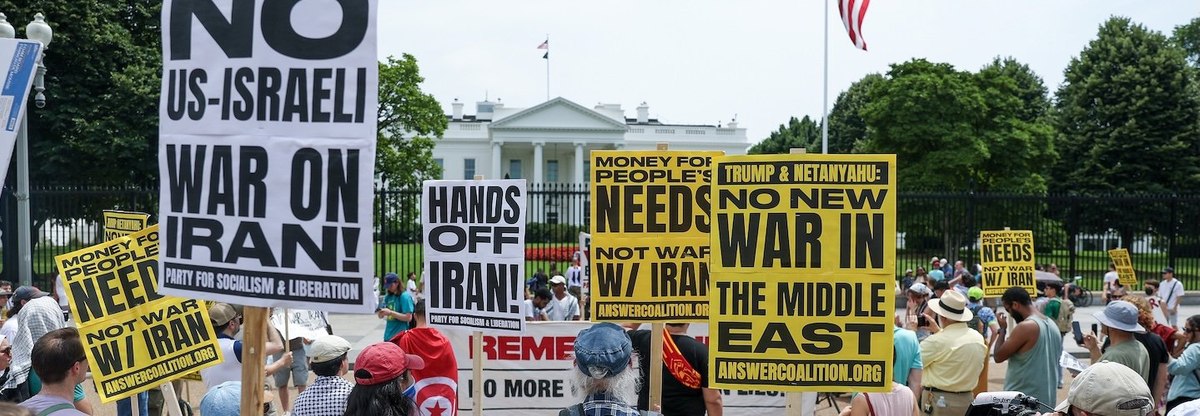More Americans disapprove than approve of the U.S. military's bombings of nuclear sites in Iran on Saturday, June 21. Opinion on the bombings is tied closely with political party identification: Most Democrats disapprove of the attacks, most Republicans approve of them, and more Independents disapprove than approve.
But YouGov's polling two days after the attack has also identified divisions about the bombings by other characteristics: age, religion, news interest, and views on foreign policy.
Older Americans and news junkies are more likely to approve of the attacks
More-liberal Americans are more likely to disapprove of the U.S. attack than are conservative Americans.
Similar shares of Americans who follow public affairs news most of the time (51%) and hardly at all (47%) disapprove of the U.S. attack. But the share who approve of the attack is about twice as high among news junkies as among those who hardly ever follow the news (43% vs. 23%).
Older Americans are more likely to approve of the attack than younger Americans.
Some of those splits mostly reflect underlying political disputes. For example, older people are more likely than young adults to identify as Republicans and more Republicans approve of the bombings. But there are clear patterns even within party groups. Younger Democrats are less likely to oppose the U.S. bombings than are older Democrats — while younger Republicans are less likely to support them than are older Republicans.
Americans who consider religion more important are more likely to approve of the U.S. bombings than those who consider religion less important. Among Americans who have a religious faith, Mormons (54% approve of the attack), Protestants (52%), and Jews (51%) are most likely to approve of the attack, while Muslims (22%) and Buddhists (10%) are least likely to approve.
Relative approval of the attack by religion is largely the same within political parties. Protestant Republicans are more approving of the attack (+71 net approval) than are Republicans who are Catholic (+57) or another religion (+65), whose religion is nothing in particular (+48), or who are atheist or agnostic (+50). Among Democrats, atheists and agnostics (-80) and those with no religion in particular (-67) are more disapproving of the attack than are Protestant Democrats (-59) and Catholic Democrats (-38).
Members of X, formerly known as Twitter, are more likely to approve of the attack (41% approve / 48% disapprove) than are members of a range of other popular social networks: Facebook (39% / 48%), LinkedIn (38% / 53%), YouTube (34% / 53%), TikTok (28% / 58%), Reddit (24% / 64%), and Tumblr (22% / 67%).
Americans who are not a member of any social networks are more likely to approve of the attack — 45% approve and 40% disapprove — than are members of any particular social network.
YouGov also asked Americans two questions related to the U.S. intervention in the Iran-Israel conflict: whether they think the U.S. should take an active part in world affairs or stay out, and which side they sympathize with more in the Israeli-Palestinian conflict.
Americans who believe the U.S. should take an active part in world affairs support the attack on Iran (58% approve / 36% disapprove) while those who say the U.S. should stay out of world affairs oppose it (21% / 69%). 81% of Americans who sympathize more with the Israelis support the attack, as do 9% of those who side with the Palestinians and 27% of those who support both sides equally.
Democrats who sympathize more with the Palestinians generally oppose the attack on Iran (net approval -77), while pro-Israeli Democrats are evenly split over the bombings. Pro-Palestinian Republicans are more likely to oppose than support the attack (-23), while pro-Israeli Republicans are more likely to support it by 88 points.
The two major U.S. political parties are divided over the bombings of Iran by their views of the global role of the U.S., similarly to how Americans overall are divided. 26% of Democrats who want the U.S. to take an active role in world affairs support the attack, compared to 9% of those who want the U.S. to stay out.
The gap is even larger among Republicans, where the attack has support from 92% of interventionist Republicans and 51% of isolationist Republicans.
Related:
- Snap polls: More Americans oppose than support the U.S. bombing of Iran
- Trump's slump continues, the bombing of Iran, Trump's budget, protests, and parades: June 20-23, 2025 Economist/YouGov Poll
See the results of this poll:
- Do you approve or disapprove of the U.S. bombing nuclear sites in Iran?
- Do you think the United States should take an active part in world affairs or stay out of world affairs?
- In the Israeli‑Palestinian conflict, are your sympathies more with...?
Methodology: The Daily Questions survey was conducted online on June 23 - 24, 2025 among 8,364 U.S. adults. The sample was weighted according to gender, age, race, education, U.S. census region, and political party. The margin of error for the overall sample is approximately 1%.
Image: Getty (Tasos Katopodis)
What do you think about the election, American politics in general, and everything else? Have your say, join the YouGov panel, and get paid to share your thoughts. Sign up here.










